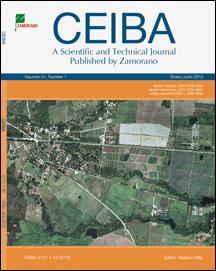Genetic Improvement of Jatropha for Biodiesel Production
DOI:
https://doi.org/10.5377/ceiba.v51i1.640Palabras clave:
Fitomejoramiento, Jatropha curcas, mejoramiento de cultivoResumen
Jatropha curcas L. is a perennial oilseed crop belonging to the Euphorbiaceae family, whose oil content in seeds varies from 33 to 38%, giving a yield potential of over 1200 kg of oil per hectare. However, it is a non-domesticated species and research is required for commercial exploration of this species for biodiesel production. The strategies of Embrapa’s jatropha breeding program aim at developing cultivars with high yield and oil content, non-toxic (absence of phorbol esters), resistant to biotic and abiotic stresses and adapted to the main producing regions of Brazil. The program activities started with the enrichment and characterization of the germplasm bank, currently with over 200 accessions from different regions of Brazil. Depending on the specific objectives of the program, different selection and breeding methods are employed. In order to understand the genetic control of specific traits and to generate segregating populations, experimental designs such as diallel crosses, which allow the estimation of heterosis, general combining ability and specific combining ability among genotypes, have been adopted. In addition, molecular markers such as SSR and SNPs are being developed and may help in early selection for characters such as the absence of toxicity in the grains. The program also includes the study on genotype × environment interaction with the evaluation of the progenies/improved clones in different regions of Brazil, which is essential for recommending cultivars for specific or broad climatic conditions. In conclusion, considering that J. curcas is a perennial species and still not domesticated, approximately 5-7 years will be required to obtain improved cultivars and evidence-based information on crop production systems to support commercial cultivation.
Descargas
1279




